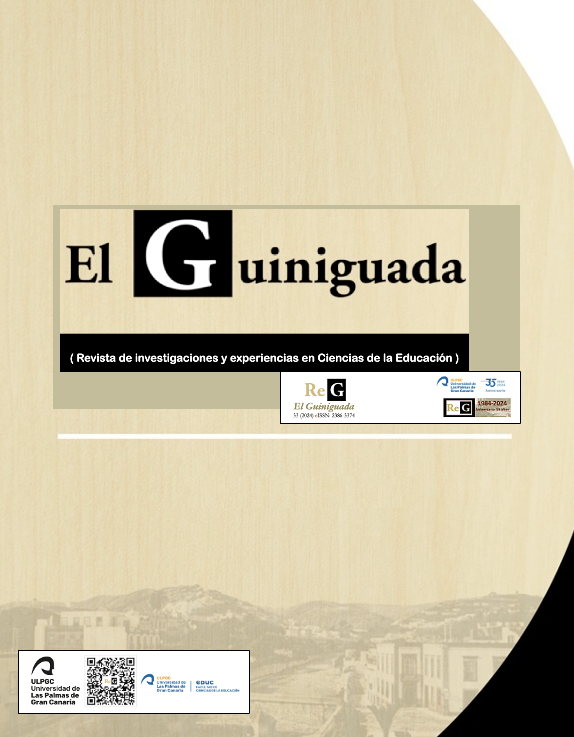Discovering the fauna and flora of our campus: an example of PBL in teacher training
10.20420/ElGuiniguada.2024.715
Keywords:
ABP, Educación Primaria, Motivación, STEAM, Innovación docenteAbstract
Disaffection shown by trainee teachers towards the learning of natural sciences restricts their performance and, therefore, their future teaching skills. Working in a STEAM context, this proposal aims to bring Project Based Learning closer to Primary Education students, providing them with new skills and tools by accomplishing a applied experience about flora and fauna. By means of a motivation questionnaire specifically designed, the degree of satisfaction of the participants with this methodology and their expectations regarding its application in the context of the Primary Education stage are analysed. Results show that students value positively the inclusion of PBL in their educational development, highlighting the importance of using active and innovative methodologies in the classroom.
Downloads
References
Ausín, V., Abella, V., Delgado, V., & Hortigüela, D. (2016). Aprendizaje basado en proyectos a través de las TIC: Una experiencia de innovación docente desde las aulas universitarias. Formación universitaria, 9(3), 31-38. http://dx.doi.org/10.4067/S0718-50062016000300005
Bohórquez, M., & Checa, I. (2019). Desarrollo de competencias mediante ABP y evaluación con rúbricas en el trabajo en grupo en Educación Superior. REDU. Revista de Docencia Universitaria, 17(2), 197-210. https://doi.org/10.4995/redu.2019.9907
Desmurget, M. (2020). La fábrica de cretinos digitales. Barcelona: Península.
Garrigós, J. & Valero-García, M. (2012). Hablando sobre aprendizaje basado en proyectos con Júlia. REDU. Revista de Docencia Universitaria, 10(3), 125-151. https://dialnet.unirioja.es/servlet/articulo?codigo=4132193
Greene, J. A. & Azevedo, R. (2009). A macro-level analysis of SRL processes and their relations to the acquisition of a sophisticated mental model of a complex system. Contemporary Educational Psychology, 18–29. doi: https://doi.org/10.1016/j.cedpsych.2008.05.006
Hernández-Ortega, J., Rovira-Collado, J. & Álvarez-Herrero, J. (2021). Metodologías activas para un aprendizaje transmedia de la Lengua y la Literatura. El Guiniguada, 30, pp. 122-134. doi.org/10.20420/ElGuiniguada.2021.409
Holm, M. (2011). Project-based instruction: a review of the literature on effectiveness in Prekindergarten through 12th grade classrooms. Sight Rivier Acad J., 7(2), 1–13. https://www.researchgate.net/publication/329000774_PROJECT-BASED_INSTRUCTION_A_Review_of_the_Literature_on_Effectiveness_in_Prekindergarten_through_12th_Grade_Classrooms
Margolin, S. J., Driscoll, C., Toland, M. J., & Kegler, J. L. (2013). E‐readers, computer screens, or paper: Does reading comprehension change across media platforms? Applied cognitive psychology, 27(4), 512-519. https://onlinelibrary.wiley.com/doi/10.1002/acp.2930
Margolis, A. A. (2020). Zone of Proximal Development, Scaffolding and Teaching Practice. Cultural-Historical Psychology, 16(3). https://doi.org/10.17759/chp.2020160303
Melón, P., Arsuaga, J. M., & Sotto, A. (2022). Influencia del perfil de acceso en el desarrollo académico de los estudiantes de los Grados en Educación Primaria de la URJC. In Desarrollo y multidisciplinariedad para la formación de los futuros docentes (pp. 189-210). La Muralla. https://dialnet.unirioja.es/servlet/articulo?codigo=8659365
Mora, F. N. (2013). Neuroeducación. Solo se puede aprender aquello que se ama. Madrid: Alianza, 45, 4.
Ortiz, D. (2015). El constructivismo como teoría y método de enseñanza. Sophia, Colección de Filosofía de la Educación, 19, 93-110. doi:https://doi.org/10.17163/soph.n19.2015.04
Portolés, M., Sotto, A., Melón, P., Arsuaga, J. M. (2023). Gamificación y Aprendizaje-Servicio en educación STEM. In Desafíos educativos actuales: investigación e innovación en el aula. Octaedro.
Reeve, J. (2012). A self-determination theory perspective on student engagement. En S. L. Christenson, A. L. Reschly, & C. Wylie (Eds.), Handbook of research on student engagement (pp. 149-172). Boston, MA: Springer US. http://link.springer.com/10.1007/978-1-4614-2018-7_7
Rekalde, I. & García, J. (2015). Aprendizaje Basado en Proyectos: un constante desafío. Innovación educativa, 25, 219-234. https://doi.org/10.15304/ie.25.2304
Ryan, R. M., & Deci, E. L. (2000). Self-determination theory and the facilitation of intrinsic motivation, social development, and well-being. American psychologist, 55(1), 68–78. https://doi.org/10.1037/0003-066X.55.1.68
Sáiz, C. (2018). Guía para trabajar desde aprendizaje basado en proyectos (ABP). RIUBU. Repositorio Institucional de la Universidad de Burgos: https://riubu.ubu.es/bitstream/handle/10259/4952/Guia_para_trabajar_ABP.pdf?sequence=3&isAllowed=y
Schank, R.C. (2022). Just in Time Medical Storytelling. In: Di Renzo, G.C. (eds) Essential Writing, Communication and Narrative Skills for Medical Scientists Before and After the COVID Era. (pp 149–158) Springer, Cham. https://doi.org/10.1007/978-3-030-84954-2_11
Serrano, J. & Pons, R. (2011). El Constructivismo hoy: enfoques constructivistas en educación. Revista electrónica de investigación educativa, 13(1), 1-27. Obtenido de https://www.scielo.org.mx/scielo.php?script=sci_arttext&pid=S1607-40412011000100001
Vallerand, R. J. (1997). Toward a hierarchical model of intrinsic and extrinsic motivation. Advances in experimental social psychology, 29, 271–360. Academic Press. https://doi.org/10.1016/S0065-2601(08)60019-2
Published
How to Cite
Issue
Section
License
Copyright (c) 2024 Pablo Melón, Miguel Portolés Reboul, Jesús M Arsuaga Ferreras, Arcadio Sotto Díaz

This work is licensed under a Creative Commons Attribution-NonCommercial-NoDerivatives 4.0 International License.
Authors who publish with this journal agree to the following terms:
- Authors retain copyright and grant the journal right of first publication with the work simultaneously licensed under a Creative Commons Attribution License that allows others to share the work with an acknowledgement of the work's authorship and initial publication in this journal. You can not make a commercial use of the work. The use derived from the work is also not allowed.
- Authors are able to enter into separate, additional contractual arrangements for the non-exclusive distribution of the journal's published version of the work (e.g., post it to an institutional repository or publish it in a book), with an acknowledgement of its initial publication in this journal.
- Authors are permitted and encouraged to post their work online (e.g., in institutional repositories or on their website) prior to and during the submission process, as it can lead to productive exchanges, as well as earlier and greater citation of published work (See The Effect of Open Access).
















